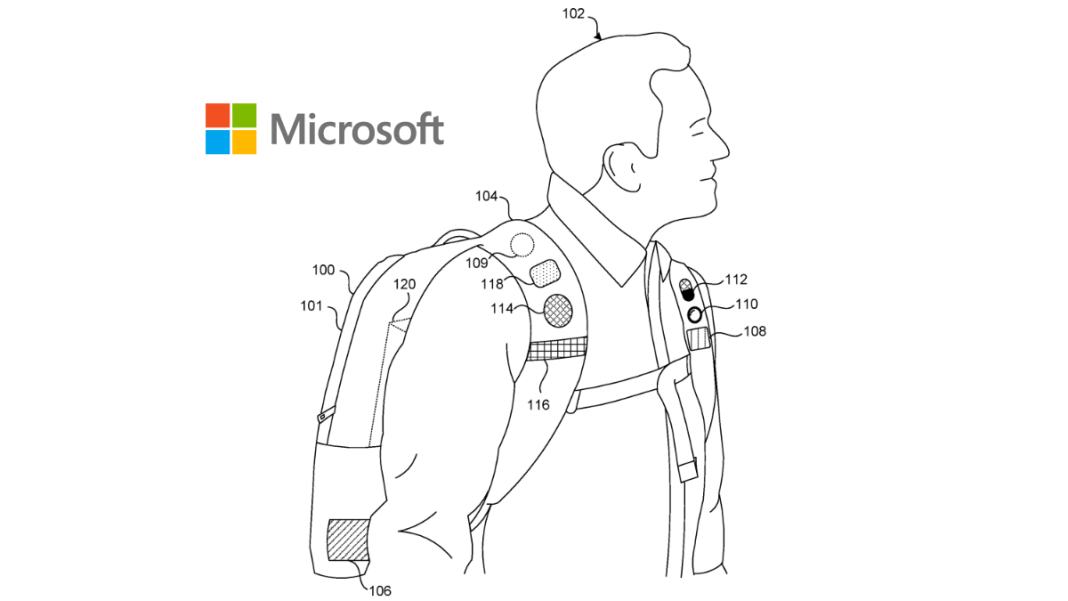In the ever-evolving landscape of artificial intelligence (AI) integration, Microsoft has thrown its hat into the ring once again, this time in a rather unexpected location – your backpack. This intriguing development comes to light through a recently filed patent on May 2, which outlines the company’s vision for AI-assisted wearables, particularly backpacks. While the concept may seem novel, the question on many minds is: Why backpacks?
The patent, as discovered by MSPowerUser, delves into the potential of incorporating sensors, including a microphone and a camera, within backpacks. These sensors would enable the backpack to receive contextual voice commands from users, opening up a realm of possibilities. One of the patent’s illustrations even showcases a skier contemplating an off-trail adventure, with the backpack offering guidance and advice. This unique approach positions the sensors strategically in the backpack’s straps, ensuring they naturally align with the user’s line of sight.
Like many AI-powered devices, Microsoft envisions these intelligent backpacks connecting seamlessly to the cloud. This connectivity would facilitate the exchange of information, enabling real-time assistance and feedback for users in various scenarios.
However, the prevailing question is whether such a product is truly necessary in a world already brimming with AI-integrated gadgets. Fitness bands, smartwatches, and smartphones already boast an array of built-in sensors and maintain persistent connections to the cloud through cellular networks. Could a backpack genuinely offer something that these devices do not?
Some critics argue that existing wearables, like fitness bands and smartphones, already cover the needs of most users. Furthermore, backpack manufacturers could potentially include emergency satellite connections for outdoor enthusiasts, ensuring safety in remote locations, similar to the Apple iPhone’s capabilities. Nevertheless, Microsoft’s vision offers unique conveniences, such as skiers being able to capture moments without removing gloves or fumbling with their smartphones.
It’s important to acknowledge that Microsoft’s track record in the wearables market has been less than stellar. The Microsoft Band and its successor, the Microsoft Band 2, made their debut nearly a decade ago but failed to gain significant traction. While they provided excellent fitness tracking and integration with Microsoft’s Office apps, they were ultimately discontinued in 2016, with refunds offered to disappointed customers in 2019.
In the realm of smartphones, Microsoft faced similar challenges. Struggling to establish its Lumia and Windows 10 Mobile platforms, the company ultimately abandoned Windows 10 Mobile in 2019, marking another setback in its hardware endeavors.
Microsoft’s history with AI assistants is equally checkered. Its partnership with Harman Kardon for the Invoke smart speaker came to an end in 2021 when Cortana, Microsoft’s AI assistant, lost support. Cortana’s trajectory within Windows was no less turbulent, transitioning from a flagship app for Windows 10 to a marginalized application in Windows 11, only to be discontinued entirely in the summer.
With a series of past setbacks, it’s reasonable to wonder if Microsoft’s venture into AI-enhanced backpacks will meet a similar fate. Patents, after all, are no guarantee of product development. Nevertheless, the question remains: Why not? Microsoft’s willingness to explore uncharted territory with AI is commendable, and while the company has faced challenges in various markets, its persistence in innovation is a testament to its commitment to pushing the boundaries of technology.
In a world where AI is becoming increasingly ubiquitous, Microsoft’s foray into AI-infused backpacks is a curious but potentially transformative endeavor. Whether this concept will materialize into a consumer product remains uncertain, but it serves as a reminder of the company’s unyielding determination to explore AI’s limitless possibilities. Time will tell if this latest patent will mark a turning point for Microsoft in the world of wearables, or if it will join the ranks of past endeavors that have faced formidable challenges.


